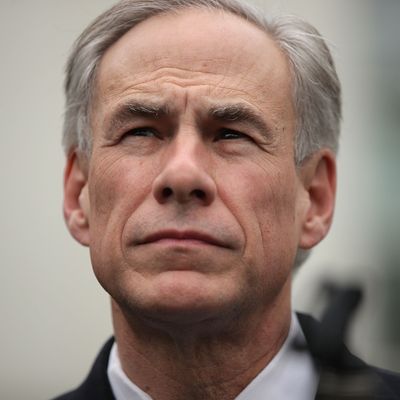
On Sunday night, Texas Governor Greg Abbott took to Facebook Live to sign the nation’s most extreme crackdown on “sanctuary cities” into law. It’s not common for governors to enact their top legislative priority online, over the weekend, and with no warning, but over the past few months SB 4 had already generated a great deal of controversy. A spokesman for the governor said he chose to sign it on social media because that’s “where most people are getting their news nowadays,” but critics say he was trying to avoid protesters.
The law will ban sanctuary cities in Texas when it goes into effect on September 1, requiring police chiefs and sheriffs to comply with requests from federal officials to detain people suspected of being in the country illegally. Jurisdictions that fail to do so will face fines of up to $25,500 per day, and officials could be ejected from office and jailed for up to a year.
The law allows local law enforcement officials to ask about the immigration status of anyone they detain, even if they’re only stopped for a traffic violation.
During the five-minute broadcast, which began around 8 p.m., Abbott pointed to the 2015 murder of Kate Steinle, who was allegedly killed by an undocumented immigrant in San Francisco, a sanctuary city. “Let’s face it, the reason why so many people come to America is because we are a nation of laws and Texas is doing its part to keep it that way,” Abbott said.
The law makes Texas the focus of the nationwide debate over the Trump administration’s immigration policies. In January, President Trump signed an executive order that called for cutting off federal funding for cities and states that refuse to cooperate with federal immigration officials. A federal judge blocked that effort last month. Despite the legal setback, Trump officials are forging ahead with their effort to crack down on illegal immigration.
As Facing South explains, Texas is not the first state to pass legislation banning sanctuary cities, and the issue predates the Trump administration:
Nationwide, at least 18 states considered policies prohibiting local measures to limit federal immigration enforcement in 2016, and 29 are considering them in 2017. According to a Facing South analysis of statewide sanctuary city bans in the South, six states — Alabama, Georgia, Mississippi, North Carolina, South Carolina and Tennessee — currently have such laws on the books. Four others — Arkansas, Florida, Louisiana and Texas — are considering anti-sanctuary city legislation. North Carolina and Tennessee are also considering legislation to make their existing laws stricter, while Georgia added new requirements to its law in 2016.
While those states have laws that urge local authorities to assist federal immigration officials, the L.A. Times notes that the Texas law is the first that says local officials will face criminal penalties if they refuse to comply with U.S. Immigration and Customs Enforcement requests.
The Texas measure has been compared to Arizona’s 2010 immigration law, SB1070. The “show me your papers” law sparked lawsuits and boycotts, culminating in the Supreme Court striking down parts of the law in 2012. As the Associated Press explains, the Texas and Arizona laws are not the same:
Whereas the Arizona law required police to try to determine the immigration status of people during routine stops, the Texas bill doesn’t instruct officers to ask. But it does allow Texas police to inquire whether a person is in the country legally, even if they’re not under arrest.
Abbott said the Texas law would withstand a legal challenge, since it had already been tested in the Arizona case. However, Angie Junck, supervising attorney at the Immigrant Legal Resource Center in San Francisco, told the L.A. Times that the Texas law directs law enforcement to conduct unconstitutional requests, and possibly engage in racial profiling.
“This law takes some of the federal policies that we’ve seen and puts it on steroids,” Junck said. “It seems this governor and the Texas Legislature are trying to outdo the federal government and design their own plan for deportations of residents and to create fear within anyone that’s in the immigrant community to drive them out of the state of Texas.”
Opponents of the Texas measure predicted that it would be stopped by the courts, much like the Arizona law and President Trump’s executive order. Thomas A. Saenz, president and general counsel of the Mexican American Legal Defense and Educational Fund, told the New York Times that by signing the bill, Abbott has “subjected Texas businesses tied to trade or tourism to incalculable losses and exposed the state’s taxpayers to substantial costs related to multiple statewide and local challenges to this inhumane law.”






























